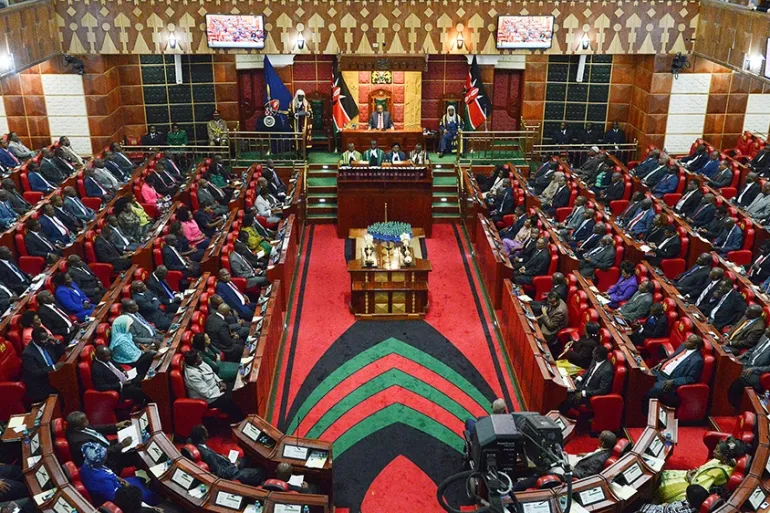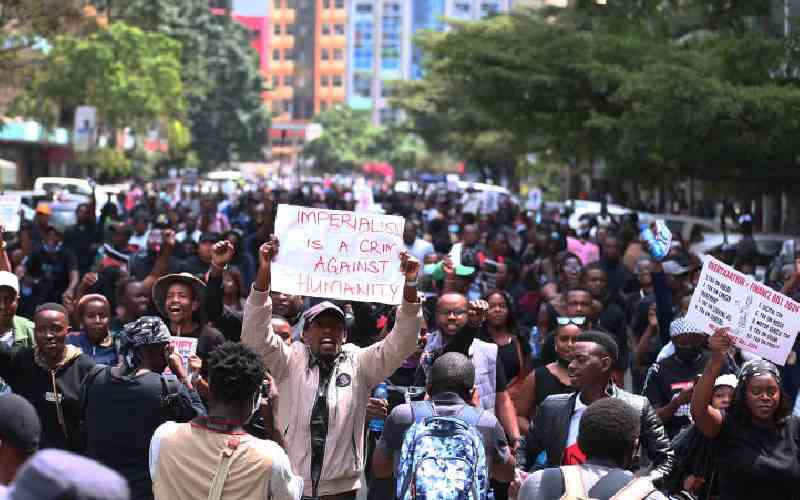Politics
Calls for MP Recalls As Protests Escalate Against Ruto’s Punitive Finance Bill

Protests are erupting across Kenya as citizens express their frustration over President William Ruto’s proposed Finance Bill, 2024.
The bill, viewed as overly punitive, has sparked widespread discontent, leading to a surge in demands to recall Members of Parliament (MPs) who support it.
Social media is ablaze with discussions about the recall process, highlighting the electorate’s growing agitation and desire for accountability.
This movement underscores a critical moment in Kenyan politics, as citizens leverage their legal rights to ensure their representatives truly reflect their interests and concerns.
Calls for MP RecallsProtests Against Punitive Finance Bill Spark Calls for MP Recalls
Kenyans are growing increasingly agitated over President William Ruto’s proposed Finance Bill, 2024.
The widely perceived as punitive bill has sparked protests and ignited a movement to recall Members of Parliament (MPs) who support it.
Social media platforms are buzzing with discussions about this recall process, highlighting the electorate’s dissatisfaction with their representatives.
Did You Know You Can Recall Your MP in Kenya?
Many Kenyans may not know they have the legal right to recall their MPs.
According to Article 104 of the Election Act, the electorate under Articles 97 and 98 can recall a Member of Parliament representing their constituency before the end of the term of the relevant House of Parliament.
This provision is designed to hold MPs accountable and ensure they represent their constituents’ interests effectively.
Calls for MP Recalls and Legal Grounds for Recalling an MP
The process and grounds for recalling an MP are clearly outlined in legislation. Parliament enacted the relevant laws in 2011, but initially, these laws included stringent requirements that made recalling an MP nearly impossible.
However, in 2017, the High Court nullified these restrictive sections, making it easier for constituents to initiate a recall process.
The High Court’s decision was a significant victory for democracy in Kenya.
Judges Kanyi Kimondo, George Odunga, and Chacha Mwita ruled that sections 45(2)(3) and (6), 46(1)(b)(ii) and (c), and 48 of the Elections Act were unconstitutional.
These sections had shielded MPs by requiring, for example, that only a registered voter in the MP’s constituency could initiate the recall and that the petition must have the support of at least 50 percent of registered voters.
The court’s ruling opened the door for any constituent, including election losers, to start the recall process.
How to Recall Your MP
Recalling an MP is a structured process. Here’s a simplified guide on how constituents can exercise this right:
- Petition Preparation: A voter who wishes to recall their MP must prepare a petition outlining the grounds for recall and file it with the Independent Electoral and Boundaries Commission (IEBC). The petition must be signed by voters and accompanied by a fee of Ksh 30,000, similar to the court fees for an election petition.
- Signature Collection: The petitioner must collect names and signatures of at least one-third of the registered voters in the sub-county. These signatures must come from different parts of the sub-county to ensure broad support.
- Verification: Within 30 days of filing the petition, the names and signatures must be submitted to the IEBC for verification. The IEBC has 15 days to verify the signatures and issue a notice of recall to the Speaker of the National Assembly.
- Recall Vote: If the petition is verified, the IEBC must prepare for and conduct a recall vote within 90 days of the notice. Voters will answer a simple ‘yes’ or ‘no’ question on whether to recall the MP. If the recall is successful, a by-election will be held to elect a new MP.
Protests Movements and Their Calls for MP Recalls
The bill includes measures that many see as burdensome and unjust, leading to widespread unrest.
Constituents are especially frustrated with MPs who support the bill. They are seeing them as disconnected from the everyday struggles of ordinary Kenyans.
The call for recalls is gaining traction as more people become aware of their rights. This movement represents a broader demand for accountability and representation in Kenyan politics.
The Importance of MP Accountability
The ability to recall MPs is a powerful tool for ensuring that elected representatives remain accountable to their constituents.
Recalling an MP is a reminder that they must prioritize the needs and interests of the people they represent.
The ongoing protests and recall movements highlight the critical role of citizen engagement in a healthy democracy.
Conclusion
The protests against President Ruto’s Finance Bill, 2024, and the subsequent recall movements reflect a significant moment in Kenyan politics.
They underscore the electorate’s demand for accountable and responsive governance.
By exercising their right to recall MPs, Kenyans are reinforcing the democratic principle that power ultimately resides with the people.
As these movements continue to unfold, they will undoubtedly shape the future of political accountability in Kenya.
Kenya Insights allows guest blogging, if you want to be published on Kenya’s most authoritative and accurate blog, have an expose, news TIPS, story angles, human interest stories, drop us an email on [email protected] or via Telegram
-

 Grapevine5 days ago
Grapevine5 days agoAlleged Male Lover Claims His Life Is in Danger, Leaks Screenshots and Private Videos Linking SportPesa CEO Ronald Karauri
-

 Lifestyle1 week ago
Lifestyle1 week agoThe General’s Fall: From Barracks To Bankruptcy As Illness Ravages Karangi’s Memory And Empire
-

 Americas2 weeks ago
Americas2 weeks agoEpstein Files: Bill Clinton and George Bush Accused Of Raping A Boy In A Yacht Of ‘Ritualistic Sacrifice’
-

 Investigations1 week ago
Investigations1 week agoEpstein Files: Sultan bin Sulayem Bragged on His Closeness to President Uhuru Then His Firm DP World Controversially Won Port Construction in Kenya, Tanzania
-

 Business2 weeks ago
Business2 weeks agoABSA BANK IN CRISIS: How Internal Rot and Client Betrayals Have Exposed Kenya’s Banking Giant
-

 News2 weeks ago
News2 weeks agoAUDIT EXPOSES INEQUALITY IN STAREHE SCHOOLS: PARENTS BLED DRY AS FEES HIT Sh300,000 AGAINST Sh67,244 CAP
-

 Business2 weeks ago
Business2 weeks agoKRA Can Now Tax Unexplained Bank Deposits
-

 News1 week ago
News1 week agoState Agency Exposes Five Top Names Linked To Poor Building Approvals In Nairobi, Recommends Dismissal After City Hall Probe

















